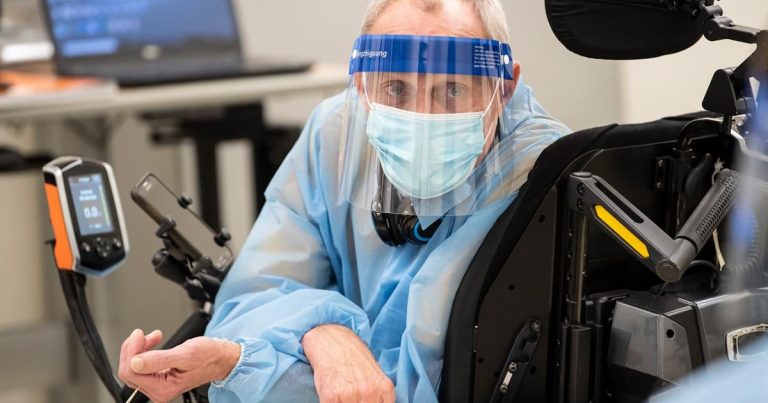As care for people with paralysis transitions to home- and community-based delivery models, the University of Pittsburgh School of Health and Rehabilitation Sciences (SHRS) and School of Medicine continue to lead research innovation with the establishment of the SmartTech Implementation Hub for Paralysis Care. This new research program offers a unique opportunity to improve independence for people with paralysis and reduce the burden on caregivers.
Thanks to a $5 million gift from an anonymous donor, work has already begun on developing the program, and once complete, the Hub will serve as a national resource center supporting research, training, policy, advocacy and knowledge transfer in the area of smart technology implementation for paralysis care.
“We are so grateful for this incredible support that advances the University of Pittsburgh's important research agenda,” said SHRS Dean Anthony Dellitto. “Thanks to this generous investment, the Hub will ultimately advance innovative solutions that will help people living with paralysis.”
Smart technology includes a wide range of tools, such as smart home devices for home automation, fitness trackers and smart pill dispensers for health management, smart security systems and sensors for safety, smartphones and other devices for hands-free communication, and virtual and augmented reality tools for interactive applications. All of these tools have great potential to improve the quality of life for people with paralysis. However, despite smart technology becoming increasingly available and affordable, those who could benefit most often encounter barriers when trying to access and implement these tools in their daily lives.
“As smart technology continues to develop, it is our mission to find new ways to integrate cutting-edge technology with the latest patient care approaches,” said Gwendolyn Sowa, professor and chair of the Department of Physical Medicine and Rehabilitation Medicine at Pitt School of Medicine.
The Hub will build on research initiated at the Rehabilitation Engineering Research Center on wireless technologies for disabilities, which aims to make mainstream wireless technologies more accessible and usable by people with disabilities. By further leveraging smart technology capabilities such as sensors, data analytics, connectivity and artificial intelligence, the Hub will provide insights into the effective implementation of these tools to improve the health and wellness of people with paralysis and support their families and caregivers.
The hub is led by Dang Ding, vice chair for research and translation and associate professor in SHRS's School of Rehabilitation Science and Technology, and Lin Worobey, assistant professor in the School of Physical Medicine and Rehabilitation. They will work with a team of engineers, physicians, physiotherapists, occupational therapists, assistive technology experts, and people living with paralysis.
Ding and Worobey conduct comprehensive needs assessments and develop, implement and evaluate smart technology services within different care settings. They are also working on creating a resource portal and developing new AI-based tools to support people with paralysis and their families.
“I'm excited and grateful for the opportunity to assemble an incredible team that shares my vision and passion, and to bring together our resources and expertise to work on a meaningful mission to empower people with paralysis through emerging technologies,” said Ding. “While technology now increasingly permeates every aspect of our lives, the systems approach we're taking promises to close the gaps in technology and make it more accessible and fully usable for people with paralysis.”
The team also formed a key partnership with the UPMC Rehabilitation Institute to provide additional support and resources to patients living with paralysis. This includes implementing a clinical research program for UPMC Mercy's inpatients, and partnering with UPMC ASSIST+, a program dedicated to providing life-enhancing products that may not be covered by insurance, to establish a space where patients and their families can browse smart technology options in person, ask questions and access educational materials. The program is expected to launch later this spring.
— Sierra Smith, Photo by Amy Obizinski

